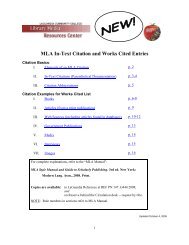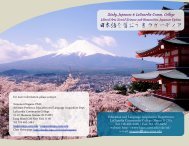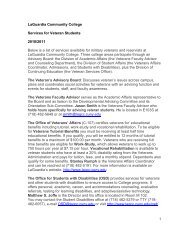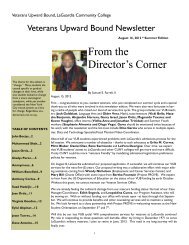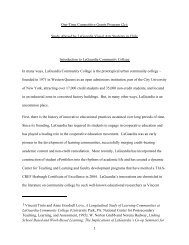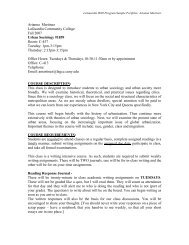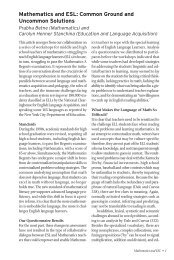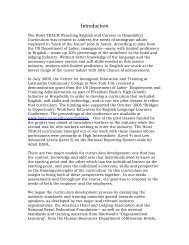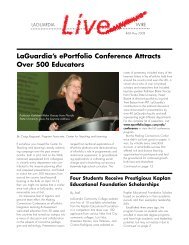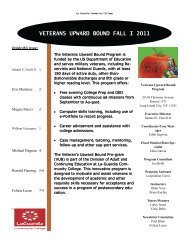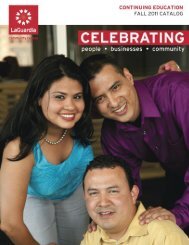COURSE INDEX - LaGuardia Community College
COURSE INDEX - LaGuardia Community College
COURSE INDEX - LaGuardia Community College
Create successful ePaper yourself
Turn your PDF publications into a flip-book with our unique Google optimized e-Paper software.
Natural Sciences Department<br />
SCB160 Food Microbiology<br />
4 credits; 6 hours (3 lecture, 3 lab)<br />
This course is an introduction to the science of food with emphasis<br />
on microorganisms which affect it. Digestive processes and fundamental<br />
chemistry of food are studied, as well as the complex<br />
interactions which exist between food and microorganisms,<br />
including handling, preparation and storage. The laboratory will<br />
focus on morphological and physiological characteristics of<br />
microorganisms associated with contamination, spoilage, preservation<br />
and food-borne disease. This course does not fulfill the<br />
Dietetic Technology General Microbiology requirement.<br />
Prerequisite: SCD100<br />
This course satisfies the New York City Department of Personnel<br />
requirement for the foods course for eligibility for School<br />
Lunch Manager.<br />
SCB201, 202 Fundamentals of Biology I and II<br />
4 credits; 6 hours each (3 lecture, 1 recitation, 2 lab)<br />
This course is an integrated two-semester laboratory-based<br />
sequence, stressing major concepts of biology designed to assist<br />
the student in relating these concepts to the environment. The scientific<br />
method of thinking and the experimental approach will be<br />
stressed. Among the topics studied are: SCB201: Cellular and<br />
molecular basis of life, heredity, and the evolution of life. SCB202:<br />
Survey of the kingdoms, organismic anatomy and physiology with<br />
emphasis on the human system, the principles of ecology, and<br />
problems of population.<br />
Prerequisite for SCB201: CSE099, ENA/ENG/ESA099/<br />
ENC101, MAT096;<br />
Prerequisite for SCB202: SCB201<br />
SCB203 Human Anatomy and Physiology I<br />
4 credits; 6 hours (3 lecture, 3 lab)<br />
Part one of a two semester introduction to human anatomy and<br />
physiology that examines the relationships between structure and<br />
function of organs and organ systems in the maintenance of<br />
normal function in the whole organism. The lab includes experimental<br />
activities, microscopy and gross anatomy. Dissections and<br />
clay modeling will be used to study select organ systems. Lecture<br />
topics include the integumentary, skeletal, muscular, cardiovascular,<br />
respiratory, lymphatic and immune systems.<br />
Prerequisite: CSE099, ENA/ENG/ESA099/ENC101, MAT096<br />
SCB204 Human Anatomy and Physiology II<br />
4 credits; 6 hours (3 lecture, 3 lab)<br />
Part two of a two semester introduction to human anatomy and<br />
physiology that examines relationships between structure and<br />
function of organs and organ systems in the maintenance of<br />
normal function in the whole organism. The laboratory includes<br />
experimental activities, microscopy and gross anatomy. Rat dissections<br />
will be used to study select organ systems. The major<br />
organ systems covered include the nervous, endocrine, digestive,<br />
urinary and reproductive systems.<br />
Prerequisite: SCB203<br />
SCB208 Vertebrate Anatomy and Physiology 1<br />
2 credits; 3 hours (1 lecture, 2 lab)<br />
This course introduces the student to the evolution, anatomy and<br />
physiology of the major vertebrate classes. Emphasis is placed on<br />
the taxonomy and characteristics of vertebrates. Muscle and bone<br />
organization and the physiology of contraction are also covered<br />
in depth. In the laboratory, students have the opportunity to dissect<br />
representative non-mammalian vertebrates.<br />
Prerequisite: SCN101 for students in Veterinary Technology<br />
Program, SCB202 for all Associate in Science students, SCC140<br />
SCB209 Vertebrate Anatomy and Physiology 2<br />
3 credits; 4 hours (2 lecture, 2 lab)<br />
This course is a continuation of Vertebrate Anatomy and Physiology<br />
1. Major organ systems are discussed while emphasis is placed<br />
on mammalian anatomy and physiology. In the laboratory, students<br />
have the opportunity to view these systems through the dissection<br />
of a cat.<br />
Prerequisite: SCB208<br />
SCB240 Biotechnology I<br />
2 credits; 4 hours (1 lecture, 3 lab)<br />
Biotechnology is the application of recombinant DNA technology<br />
to living systems. Biotechnology I is an introductory laboratory<br />
course which will allow the student to learn some of the basic<br />
techniques used in molecular biology and recombinant DNA laboratories.<br />
This course will include basic applications of gel electrophoresis<br />
and interpretation of restriction enzyme cleavage<br />
patterns of DNA, including DNA fingerprinting.<br />
Prerequisite: SCB201 or SCB208 or SCC201<br />
SCB252 Fundamentals of Biotechniques<br />
2 credits; 4 hours<br />
This is an intensive one-semester laboratory-based course in<br />
biotechniques. Students will learn how to form hypotheses, design<br />
experiments, analyze data, and review science literature. Students<br />
will perform techniques such as bacterial transformation,<br />
purification of nucleic acids, Polymerase Chain Reaction (PCR),<br />
electrophoresis, DNA microarray analysis, enzyme-linked<br />
immunosorbent assay (ELISA) and histological techniques, while<br />
learning the responsible conduct of research and bioethics.<br />
Prerequisite: ENG101, MAT115, SCB201, SCC201<br />
SCB255 Cell Biology<br />
4 credits; 6 hours<br />
This is an upper-level one-semester laboratory-based course<br />
stressing essential aspects of cell biology. Cell structure and<br />
function will be introduced. Topics to be covered include, but are<br />
not limited to, membrane transport, protein sorting, vesicular<br />
trafficking, cytoskeletal components, chromatin remodeling,<br />
signal transduction, cancer, apoptosis and stem cells. Students, by<br />
conducting hypothesis-driven science, will be introduced to stateof-the-art<br />
techniques.<br />
Prerequisite: ENG102, MAT200, SCB202, SCC202<br />
164



